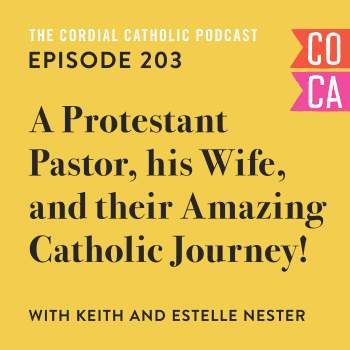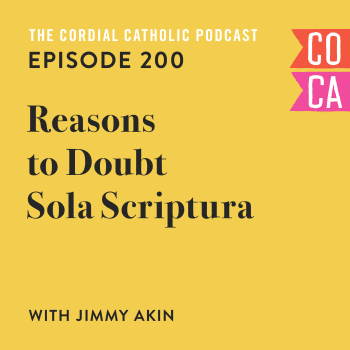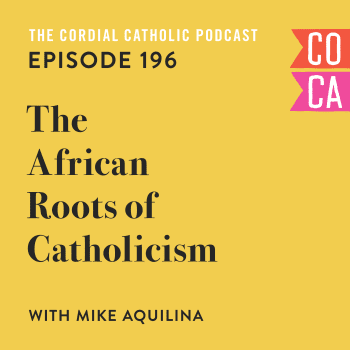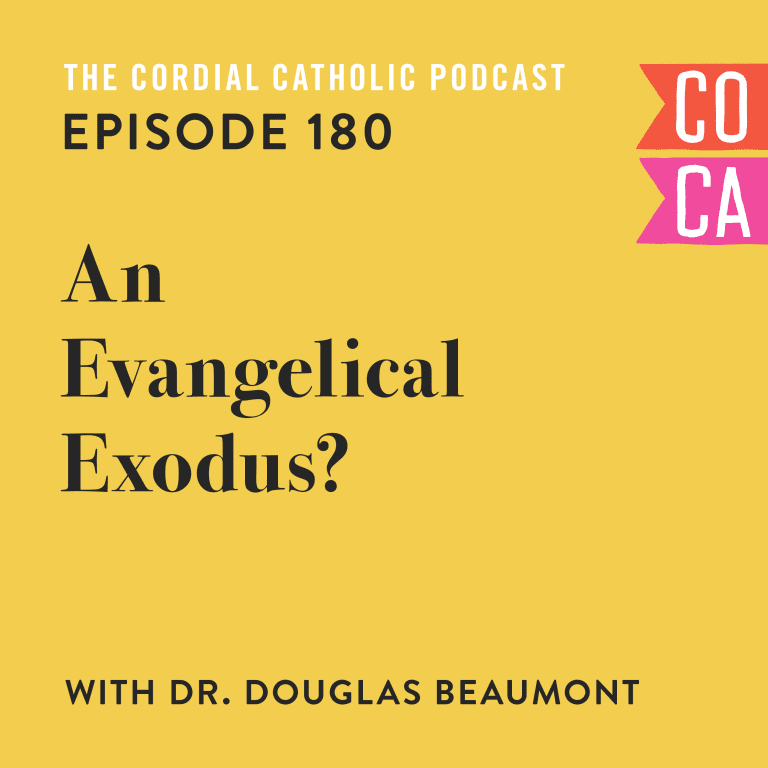
I’ve always said the last thing that I want to do is to put down my Protestant heritage. I wouldn’t be the person—or the Christian—that I am today without the experience of faith I’ve had these last fifteen years. I’ve been a Protestant, and I’ve been proud of it, but I’m becoming a Catholic and I’m trying my best to explain why. Understand, then, that this is my journey and I write from my own perspective. Understand that I try to do this with love and respect and as cordially as I can. What I write about are my own bumps along the way, my own joys, and my own discoveries. You certainly don’t have to agree, or empathize, but maybe you do, or maybe you will.
I’ve spent the last little bit of my Protestant faith life struggling, sometimes profoundly. Even before seriously considering Catholicism I found myself at odds with some of the diversity and divergence in the Christian Church, writ large. I struggled, and have struggled for a long time, with the chasmic differences between Protestant denominations all the way back to my early days as an evangelical Christian in high school, when I first met Christ. I can trace this back to the uncomfortable feelings I had when the Christian message being shared at a youth retreat didn’t jive with the Christian message being shared at my home church.
I felt the similar rub of uncertainty a few years later when I was told by a charismatic pastor that if I wasn’t receiving “visions and dreams” like it says in Acts that I must be doing something wrong. That I didn’t want it badly enough.
See, what I realized fairly early on in my Christian journey is something that I’m only recently able to measure, bound up, and put words to. And that is that there’s no such thing as Protestant Christianity. There are Protestant Christian denominations. And that’s a profoundly different thing.
There is no singular experience or expression or theology of Protestant Christianity.
In contrast to the rock of the Catholic Church, Protestantism is a flotilla of loosely affiliated life rafts.
What Do Protestants Have in Common?
It’s not a perfect metaphor and it’s intentionally hyperbolic but I’m prepared to defend it because I think it works—and I think it’s true, if I can speak from my experience.
My unease with the disparate experience of Protestantism began shortly after becoming a Protestant and it couldn’t, even then, be papered over very easily. When one church teaches that we’re living in the End Times and young Christian men must be receiving dreams and visions and another church teaches that folks who make those claims are crazy that is, in a word, disunity.
And Paul rails against that in his inspired letters, quite extensively.
But if I felt on unsteady ground back in high school over the differences between the radical missionary preacher and shirt-and-tied Baptist pastor my discomfort only increased as time went by. I don’t think, given the current Christian climate, that my flotilla analogy is all that off the mark. And, I know, it might be a little harsh but bear with me a moment longer.
Because what binds us Protestants these days?
We have our faith statements, and our creeds but with the emptying of mainline denominations and even the traditional evangelical churches in favour of non-denominational brands what we have in common seems to be less and less.
We agree on Jesus, God, and the Holy Spirit. The Trinity, for the most part. We agree that there are such things as baptism and communion but even what we make of those very basic things—things that Jesus did and taught Himself—varies greatly.
Some say that baptism saves, others balk at such a scandal. Some say we’re justified by Christ and we can’t do anything to jeopardize that, others say we can lose salvation. Some say we must speak in tongues, others that we mustn’t. Some take the whole Bible literally, others pick and choose.
The Catholic Alternative
The appeal of the Catholic Church, to me, is simple. It’s historically rooted. A tradition which can trace it’s lineage and teaching back to the first apostle is either a complete historical fiction—which it’s not—or something worth considering. It’s spiritually rich. With two thousands years of spiritual traditions, with it’s scores of unique orders, fraternities, and disciplines you could lose a lifetime plumbing the depths of devotion within Catholicism. And it’s intellectually rigorous. Catholic scholarship is not among the best in Christianity but it is the best. Consider the scores of distinctly Catholic theologians to whom Christianity as a whole is indebted.
In the rapidly shifting seas of our post-post-modern world I’ve found is a firm foundation. The Catholic Church. Which claims succession from the first apostles and a distinct tradition of teaching which derives its authority from that same successive lineage.
This is compelling stuff.
But there’s more.
The alternative to a flotilla of life rafts in the churning sea is a rock, right smack in the middle. Steady as she goes. Unmoving. Yes, those within the Catholic Church make mistakes. The institution is divinely protected, not the people that make it up. And, certainly, the Catholic Church doesn’t necessarily speak with one homogeneous voice on every and all matters—it’s bigger on the inside with a rich diversity but all under the same umbrella. All upon the same rock—Jesus Christ, and through His authority, the Pope.
The rock of the Catholic Church is a striking alternative to a Christian culture where, if I don’t like the message or the medium I can go elsewhere. Where, if the theology doesn’t suit my interpretation, I can find somewhere that does. The Catholic Church, the rock, doesn’t accommodate. It doesn’t float along the waves. It stands. It proclaims. It is unmoved and, in this, there is a distinct appeal.
If I don’t like it, I can leave, and I can’t go down the street to find another church that’s a better fit because, on matters of theology and practice, the Catholic Church does speaks with one voice.
I see, in Protestant denominations, a shaping of the truth to fit us rather than an accepting of the truth as it is, as it was, and as it always has been. Catholicism is a Christianity of a table, laid with a fulsome meal, where my Protestant Christianity was a buffet. Catholicism tells me what best fits with a life in Christ, where my Protestant Christianity offered me to pick and choose which life in Christ best fits me.
The difference is distinct—and fundamental.
The Appeal of the Catholic Church (To a Protestant Like Me)
Ultimately, I’m becoming Catholic because here is a church that doesn’t become what I want it to be because I want it to be that. It doesn’t cater to me with it’s location, it’s liturgy, it’s worship style, or it’s demographic. Here’s a church that says: This is what I am, take it or leave it.
A church that makes the bold claim that this is what I’ve always been. And, this is what the Lord made me. In fact, the Lord made me is a pretty fundamental claim. And on, I’d say, pretty solid footing.
The appeal of the Catholic Church to a post-modern Protestant like me is simple. I don’t trust myself. The Catholic Church is that unmoving rock in the midst of the stormy seas and I am faced with a choice. Do I trust myself to find the most comfortable and most correct life raft, destined to one day reach dry land? Or do I cleave myself to the rock, ageless and ancient, that makes such grandiose claims as to be that dry land?
For me there is only one option that makes sense.

















